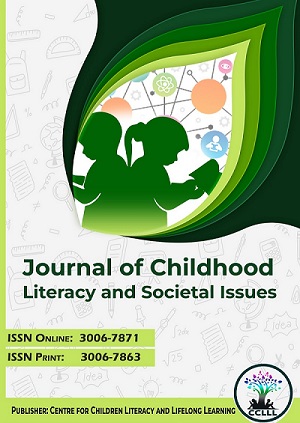Evaluation of challenges faced by the early childhood care and education due to the shortage of teachers in Punjab, Pakistan
DOI:
https://doi.org/10.71085/joclsi.03.02.50Keywords:
Early Childhood Care and Education (ECCE), ECCE Challenges, Shortage of Teachers, ECE Punjab, School Education Department PunjabAbstract
Early Childhood Care and Education (ECCE) is essential in developing young children's fundamental cognitive and social-emotional skills. This research examines the difficulties encountered by early ECCE in Punjab, Pakistan, specifically highlighting teacher shortages, insufficient teacher training, and the underutilization of available resources. Using a mixed-method approach, data were collected from 40 ECCE schools in Bahawalnagar District. Data were collected quantitatively from the School Information System (SIS), and qualitative data were gathered through interviews from caretakers of ECCE rooms and classroom observations. Research indicates a severe teacher shortage in Punjab, where 107,372 teaching positions are unfilled, with 3,984 vacancies concentrated in Bahawalnagar. More than 95% of ECCE teachers and caregivers are deficient in essential skills; conversely, over 50% of educational institutions cannot utilize ECCE kits to their full potential due to insufficient training. Overcrowding is widespread, with approximately 70% of schools combining ECCE, Playgroup, and Nursery classes under a single caretaker, ultimately compromising educational standards. The situation delivers fewer results because government policies fail and organizations waste available resources. The research recommends filling the vacant posts of teachers, launch teachers’ trainings programs with ECCE. By addressing the challenges ECCE will be fruitful for ECCE learners.
Downloads
References
Ahmad, M., Jatoi, H., & Riaz, S. (2019). Proposed strategies for the effective implementation of early childhood education programme in Punjab. Global Regional Review, 4(1), 77-86.
Ansari, A., Fasih, T., & Humphry, E. (2024). Ten Years of Early Childhood Education (ECE) in Punjab (Pakistan): What Have We Learned?. Journal of Research in Childhood Education, 38(sup1), S161-S179.
Arshad, M., & Zamir, S. (2018). Situational analysis of early childhood education in Pakistan: Challenges and solutions. JECCE, 2.
Artipah, A., Sain, Z. H., & Asfahani, A. (2024). Early Childhood Education Reform in Pakistan: Challenges, Innovations, and Future Prospects. Absorbent Mind: Journal of Psychology and Child Development, 4(1), 57-64.
Bustos-Orosa, M. A. (2024). Early Childhood Education in Philippines. In International handbook on education in South East Asia (pp. 1-26). Singapore: Springer Nature Singapore.
Fenech, M., Waniganayake, M., & Fleet, A. (2009). More than a shortage of early childhood teachers: Looking beyond the recruitment of university qualified teachers to promote quality early childhood education and care. Asia-Pacific Journal of Teacher Education, 37(2), 199-213.
Fredman, S., Donati, G., & Naicker, S. (2022). New beginnings: The right to equality and early childhood care and education. South African Journal on Human Rights, 38(3-4), 167-191.
Heiskanen, N., Saha, M., Pesonen, H., Viljamaa, E., Poikola, M., Nevala, P., & Karna, E. (2024). The ultimate responsibility? The analysis of the position of special education teachers when the child is left without support in early childhood education. Journal of Research in Special Educational Needs.
Hu, B. Y., Roberts, S. K., Leng Ieong, S. S., & Guo, H. (2016). Challenges to early childhood education in rural China: Lessons from the Hebei province. Early child development and care, 186(5), 815-831.
Hunzai, Z. N. (2009). Teacher education in Pakistan: Analysis of planning issues in early childhood education. Journal of Early Childhood Teacher Education, 30(3), 285-297.
Iqbal, M. Z., Khalid, H. A., & Tufail, M. (2021). Early Childhood Education Programme in Punjab: Voices of Teachers and Head Teachers. Journal of Educational Sciences & Research, 8(1), 169-187.
Kambona, W., & Ndibalema, P. (2025). Examining inequalities in provision of early childhood education in Tanzania: a systematic review. Cogent Education, 12(1), 2439161.
Mahmood, S. (2013). “Reality shock”: New early childhood education teachers. Journal of Early Childhood Teacher Education, 34(2), 154-170.
Malik, S., & Asghar, M. Z. (2021). The Effectiveness of Early Childhood Education Program in Public Schools of Punjab. Journal of Business and Social Review in Emerging Economies, 7(2), 329-341.
Masso, S., Campbell, E., Faulkner, H., & Britton, A. (2023). Evaluating resources required to evaluate child outcomes following indirect services in early childhood education centres: A scoping review. Health Promotion Journal of Australia, 34(2), 294-302.
Orkin, K., Abebe, W., & Woodhead, M. (2012). Delivering quality early learning in low-resource settings: Progress and challenges in Ethiopia. Bernard van Leer Foundation.
Qi, X., & Melhuish, E. C. (2017). Early childhood education and care in China: History, current trends and challenges. Early Years, 37(3), 268-284.
Rafiq, S., Kamran, F., & Afzal, A. (2023). Enhancing professional motivation in the early childhood teacher education: Unraveling issues and challenges. Journal of Social Sciences Development, 2(1), 26-43.
School Information System. (2024). Retrieved September 15, 2024, from Pesrp.edu.pk website: https://sis.pesrp.edu.pk/
Simon, A., Shah, A., Quy, K., & Owen, C. (2024). Financialisation and private equity in early childhood care and education in England. Journal of Social Policy, 53(2), 512-529.
Sumsion, J. (2019). International perspectives on early childhood care and education policy and practice. The Wiley handbook of early childhood care and education, 641-660.
Tekin, A. K. (2016). Attitudes of Omani early childhood preservice teachers toward bilingual early childhood education: Benefits, challenges, and solutions. Child & Youth Services, 37(1), 78-91.
Woodhead, M., Ames, P., Vennam, U., Abebe, W., & Streuli, N. (2009). Equity and quality? Challenges for early childhood and primary education in Ethiopia, India and Peru. Bernard van Leer foundation.
Yasrab, G., & Shah, S. S. A. (2022). Impact of Early Childhood Education Project on Students’ Cognitive Development at School in the Punjab, Pakistan. Pakistan Languages and Humanities Review, 6(2), 318-327.
Downloads
Published
Data Availability Statement
Most details about School Education Department are available at https://sis.pesrp.edu.pk/ and the data collected through interview guide will be provided on a reasonable request to the corresponding author
License

This work is licensed under a Creative Commons Attribution-NonCommercial-ShareAlike 4.0 International License.
This work is licensed under a Creative Commons Attribution-NonCommercial-ShareAlike 4.0 International License.
The Creative Commons-Attribution-Noncommercial-Share Alike License 4.0 International applies to all works published by Journal of Childhood Literacy and Societal Issues. Authors will retain copyright of the work.





